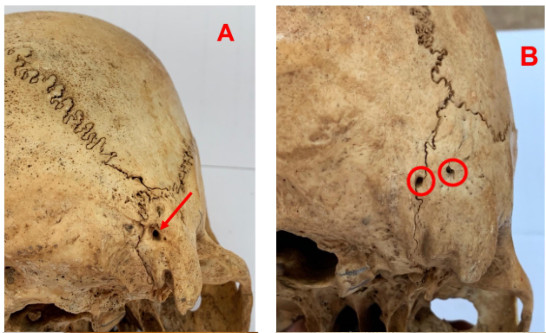Mastoid Emissary Foramina and their Surgical Relevance: An African Osteological Study
Schlagworte:
mastoid emissary vein, foramina, AfricanAbstract
Background: The mastoid emissary vein (MEV) is a small venous channel connecting intracranial and extracranial venous systems. It travels in the mastoid foramen and is the usually occurs singly or multiply. Recognition of MEVs during neurosurgery is essential to avoid hemorrhage or thromboembolism of the sigmoid sinus. Data regarding their characterization and occurrence in the African setting still remains scarce. This study aimed to assess the prevalence of these foramina and shed light on their significance in neurosurgery. Methods: This descriptive cross-sectional study was conducted on 105 dry sexed skulls obtained from the National Museums of Kenya. The mastoid bones were examined for the number of mastoid foramina and the relative distances of each foramen to the asterion and tip of mastoid process. Distances were recorded by use of a digital Vernier calliper (precision of 0.01mm) and data were analysed using SPSS (version 26.0). Results: Mastoid emissary foramina were observed in 80 skulls on the right side (88.1%) skulls and in 76 (86.2%) skulls on the left. The mean distance to the asterion was 21.09 6.74 mm and 28.56 5.81 mm to the tip of the mastoid process. Conclusion: The mastoid emissary foramina which represent channels of MEVs are relatively constant structures in African skulls. Neurosurgeons should take caution given their high prevalence and approximate locations using the findings in this study to prevent haemorrhage or thromboembolism.
Literaturhinweise
Tsutsumi S, Ono H, Yasumoto Y. The mastoid emissary vein: an anatomic study with magnetic resonance imaging. Surgical and Radiologic Anatomy. 2017 Apr;39(4):351-6.
Louis RG, Loukas M, Wartmann CT, Tubbs RS, Apaydin N, Gupta AA, Spentzouris G, Ysique JR. Clinical anatomy of the mastoid and occipital emissary veins in a large series. Surgical and radiologic anatomy. 2009 Feb;31(2):139-44.
Kim, L.K., Ahn, C.S. and Fernandes, A.E., 2014. Mastoid emissary vein: anatomy and clinical relevance in plastic & reconstructive surgery. Journal of Plastic, Reconstructive & Aesthetic Surgery, 67(6), pp.775-780.
Irmak MK, Korkmaz A, Erogul O. Selective brain cooling seems to be a mechanism leading to human craniofacial diversity observed in different geographical regions. Medical hypotheses. 2004 Jan 1;63(6):974-9.
Hampl, M., Kachlik, D., Kikalova, K., Riemer, R., Halaj, M., Novak, V., Stejskal, P., Vaverka, M., Hrabalek, L., Krahulik, D. and Nanka, O., 2018. Mastoid foramen, mastoid emissary vein and clinical implications in neurosurgery. Acta neurochirurgica, 160(7), pp.1473-1482.
Pekçevik R, Öztürk A, Pekçevik Y, Toka O, Aslan GG, Çukurova İ. Mastoid Emissary Vein Canal Incidence and Its Relationship with Jugular Bulb and Sigmoid Sulcus Anatomical Variations. Turkish Archives of Otorhinolaryngology. 2021 Dec;59(4):244.
Crocker M, Nesbitt A, Rich P, Bell B. Symptomatic venous sinus thrombosis following bone wax application to emissary veins. British journal of neurosurgery. 2008 Jan 1;22(6):798-800.
Reis CV, Deshmukh V, Zabramski JM, Crusius M, Desmukh P, Spetzler RF, Preul MC. Anatomy of the mastoid emissary vein and venous system of the posterior neck region: neurosurgical implications. Operative Neurosurgery. 2007 Nov 1;61(suppl_5):ONS193-201.
Koesling S, Kunkel P, Schul T. Vascular anomalies, sutures and small canals of the temporal bone on axial CT. European journal of radiology. 2005 Jun 1;54(3):335-43.
Pereira GA, Lopes PT, Santos AM, Pozzobon A. Study of landmarks in dried skulls in a Brazil population. Journal of Morphological Sciences. 2017 Jan 16;30(2):0-.
Murlimanju BV, Chettiar GK, Prameela MD, Tonse M, Kumar N, Saralaya VV, Prabhu LV. Mastoid emissary foramina: an anatomical morphological study with discussion on their evolutionary and clinical implications. Anatomy & cell biology. 2014 Sep 1;47(3):202-6.
Mortazavi MM, Tubbs RS, Riech S, Verma K, Shoja MM, Zurada A, Benninger B, Loukas M, Cohen Gadol AA. Anatomy and pathology of the cranial emissary veins: a review with surgical implications. Neurosurgery. 2012 May 1;70(5):1312-9.
Hoshi M, Yoshida K, Ogawa K, Kawase T. Hypoglossal Neurinoma—Two Case Reports—. Neurologia medico-chirurgica. 2000;40(9):489-93.

Downloads
Veröffentlicht
Zitationsvorschlag
Ausgabe
Rubrik
Lizenz
Copyright (c) 2023 East African Journal of Neurological Sciences

Dieses Werk steht unter der Lizenz Creative Commons Namensnennung - Nicht-kommerziell - Keine Bearbeitungen 4.0 International.

